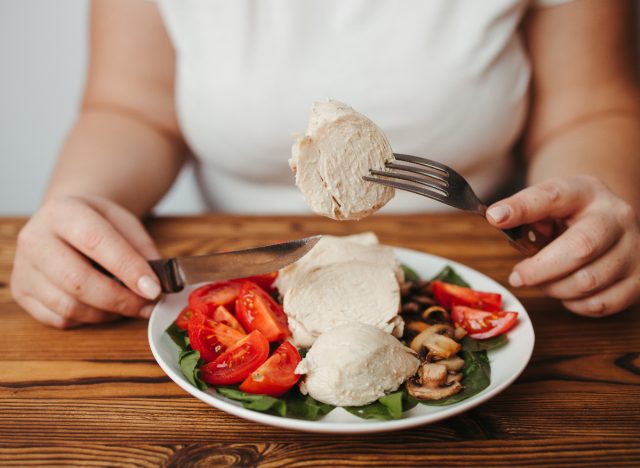How to Prevent Gaining Weight in Your Belly

The battle against the belly bulge is all too real. Packing on extra pounds around the waistline is a common frustration many individuals deal with. Whether you lead a more sedentary lifestyle, have a penchant for fast food, or experience high levels of stress, keeping your belly in top shape can feel like an uphill struggle. But don’t fret—we’re taking a deep dive into how to prevent gaining weight in your belly, so listen up.
Before we begin, it’s important to note that spot reduction is a myth. That means you can’t specifically stop fat from accumulating in a certain area of your body, like the belly. However, by following healthy lifestyle habits, such as eating a nutritious diet, performing regular exercise, and adopting proper sleep management techniques, you can prevent weight gain throughout your body.
“Although there is no way to specifically target your belly area in a set amount of time with diet as weight comes off from everywhere when you lose it, there are some practices that can help the debloating process so that your belly feels less extended and then you naturally just feel better overall,” confirms Laura Burak MS, RD, founder of GetNaked® Nutrition and author of Slim Down with Smoothies.
Now, let’s see what Burak has to say about how to prevent weight gain in your belly (and throughout your body).
Here’s how to prevent gaining weight in your belly:
1. Drink plenty H2O.

Drinking more water is crucial if you want to lose weight. In fact, research backs this up. According to a study published in the Journal of Nature Science, Biology and Medicine, individuals who drank more water before meals over an eight-week timeframe experienced a reduction in body weight and lower appetite scores.
“Most of you are chronically dehydrated, which can affect every process in the body and prevent your built-in detox system, aka your liver and kidneys, from flushing out waste as efficiently,” explains Burak. “For example, when you eat a salty meal without enough water to flush it out, you may end up feeling bloated in your belly area. Adequate hydration just keeps everything flowing and keeps you regular in the bathroom. Chronic constipation and gastrointestinal problems can lead to belly bloating, gas, and discomfort in the area.”
2. Eat more plants.

Incorporate more plant-based foods into your diet, as they’re top sources of naturally occurring fiber, antioxidants, and nutrients. Burak encourages you to pair your plants with lean sources of protein such as fish, eggs, poultry, seeds, and nuts to keep your blood sugar stable and preserve homeostasis.
3. Space out your meals.

Properly spacing out meals helps you avoid consuming a larger meal later on. Eating a giant plate of food at dinnertime is a surefire way to pack on unwanted pounds around your waistline. In fact, research shows that night and later meal timings can negatively affect weight regulation. “[It can also] have other effects on your health like reflux and trouble sleeping,” Burak explains.
4. Eat more when you feel you need the energy boost.

Depriving yourself won’t lead you anywhere good and can actually promote over-eating. Burak suggests eating more when you feel your body needs an energy boost.
“Fueling your body more when you actually need the energy so your body can use it more efficiently, which is usually during the daytime hours, will help your body maintain a healthier weight rather than consuming thousands of calories at night when you’re home sitting on the couch,” she explains.
5. Move your body daily.

It can be easy to fall into sedentary habits, especially if you work from home. But moving your body daily is essential for reducing belly fat, Burak stresses. Striking a perfect balance of cardio and strength training will help you lead an all-around healthier lifestyle. Plus, research shows that embracing a regular exercise routine can decrease fat mass while boosting lean muscle mass.
In addition, consider incorporating natural supplements into your workout nutrition. “Using natural supplements like ginger, lemon, mint, dandelion and bromelain-containing foods like pineapple can quickly help flatten a bloated belly, although it may be temporary,” says Burak.
6. Assess your overall lifestyle.

Keep in mind that if you want to see noticeable results or changes, you need to assess your lifestyle as a whole.
“Always keep in mind that food or exercise alone are not the only factors that matter with excess belly fat and overall weight management,” explains Burak. “You have to look at your life as a whole and address every area because they are all interrelated. I see clients who are ‘doing everything right’ when it comes to eating, but they haven’t addressed their stress, for example, so their weight-loss journey will be impacted.”
- Source: Effect of excessive water intake on body weight, body mass index, body fat, and appetite of overweight female participants
- Source: Bloating and Abdominal Distension: Clinical Approach and Management
- Source: The Impact of Meal Timing on Risk of Weight Gain and Development of Obesity: a Review of the Current Evidence and Opportunities for Dietary Intervention
- Source: Effect of Exercise Training on Fat Loss—Energetic Perspectives and the Role of Improved Adipose Tissue Function and Body Fat Distribution









